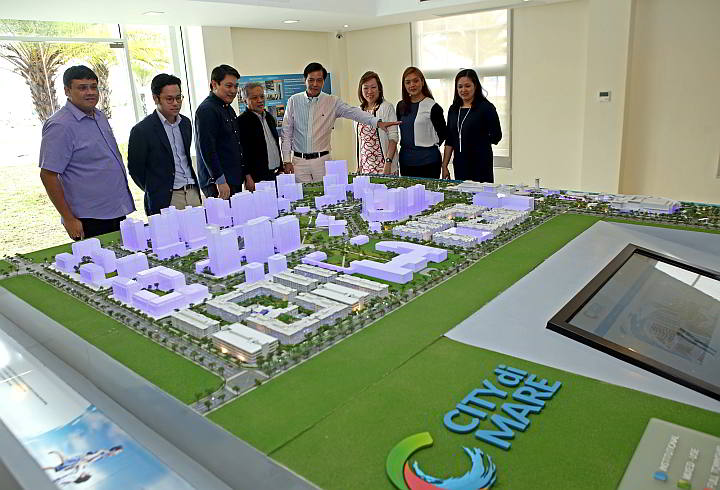YEARENDER: REAL ESTATE
Experts see growth in all segments of the industry to continue in 2015

Filinvest Land Inc. officials led by Lourdes Josephine Gotianun-Yap (sixth from left) show the scale model of ther South Road Properties project, City di Mare, to Cebu City officials led by Mayor Michael Rama (5th from left) during last Dec. 16’s launching of their new master plan. (CDN FILE)
A robust economy, Cebu’s attractiveness to investors and continued recovery efforts in typhoon-struck parts of northern Cebu drove the real estate and construction industries’ growth last year.
Investors showed confidence in Cebu’s real estate market by placing millions of pesos worth of developments, said Samuel O. Lao, Philippine Association of Realtors Boards-Cebu Real Estate Board (Pareb-Cereb) president.
“Major developers like Megaworld Corp., Ayala Land, Inc. (ALI), SM Development Corp. (SMDC) and Filinvest Land, Inc. (FLI) continue to invest here, adding more projects in Cebu. That is already an indication that Cebu’s real estate market is growing very fast,” he said.
FLI recently announced that it raised capital expenditure for a 50-hectare joint venture project with Cebu City, the City di Mare, from P10 billion to at least P25 billion.
FLI also soft opened in November the first tower of a joint venture project with the Province of Cebu, Filinvest Cyberzone Cebu, which is set to create at least 12,000 more jobs for Cebu.
Local developers are also putting in their millions into residential and commercial projects.
One of the aggressive local players is Cebu Landmasters, Inc. (CLI) which recently announced it would launch four new projects next year worth at least P3 billion.
Another local developer, Johndorf Ventures Corp., has committed at least 2,000 more economic house and lot units to be available in Cebu in the next five years with at least P2 billion in investments.
Based on figures from the National Economic Development Authority, the GRDP (Gross regional development product) per capita growth rate in Central Visayas grew by 5.8 percent last year, which was higher than the national GDP per capital growth rate of 5.3 percent.
“That means more people in the region are earning more and have more disposable income that they spend for lifestyle improvements including buying their own house,” said Lao.
In the first half of 2014, poverty incidence in the region improved by 0.3 percent.
Cebu registered higher improvement of 3.4 percent.
The number of building permits which corresponds to projects in Cebu last year was 1,760 buildings with a development investment value of at least P9 billion.
PROSPECTS FOR 2015
The upbeat momentum of the industry is expected to continue in 2015.
“The growth will come from all segments – commercial, residential, high-end to economic housing,” said Philippine Allied Chamber of Real Estate Brokers and Licensed Salesmen (PhilAcre) president Anthony Leuterio.
Leuterio expects more developers to still build residential properties next year.
He said the market will be dominated by local developers despite the growing presence of major national players.
“Local developers are likely to get hold of the market compared to national players because they have more knowledge about it, and they have the land banks,” he said.
He also said that with the decreasing land banks in the metro area, there will be more pocket condominium subdivisions as well as more developments outside of Metro Cebu.
“More affordable and better payment schemes will be the game changer next year with more developers trying to compete for the market. Overseas Filipino workers will continue to be our top buyers while foreign buyers who are looking to retire or invest here are also catching up fast,” he said.
Leuterio said the local market will continue to buy affordable house and lot units while investors prefer condominium properties.
Meanwhile, demand for property rental in both commercial and residential project will also get more exciting next year.
Leuterio said some developers like Primary Homes, Inc. are designing projects that buyers can easily lease out.
“Rental will be a great enterprise in 2015 with office spaces becoming available in Cebu as well as a continued demand for housing units,” he said.
CHALLENGES
With all this potential economic growth in Cebu, Lao and Leuterio said that it would help if the government can hasten infrastructure projects to help solve traffic congestion and flooding especially in Metro Cebu area where most projects are concentrated.
Disclaimer: The comments uploaded on this site do not necessarily represent or reflect the views of management and owner of Cebudailynews. We reserve the right to exclude comments that we deem to be inconsistent with our editorial standards.
